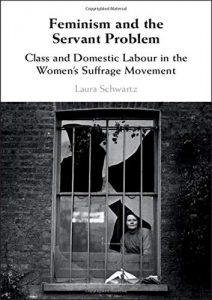 Class and Domestic Labour in the Women’s Suffrage Movement
Class and Domestic Labour in the Women’s Suffrage Movement
Published by Cambridge University Press 18 July 2019
248pp, hardback, £75
Reviewed by Zoë Fairbairns
‘Around 1900, most British women were either members of households that employed servants, or servants themselves,’ writes Laura Schwartz, Associate Professor of Modern British History at the University of Warwick, in her meticulous, fascinating study of Feminism and the Servant Problem.
She sets out to show ‘how feminists thought about domestic service, and how servants thought about feminism.’ She identifies the suffrage movement as ‘a moment in history when these two groups of women were sometimes united – when servants became feminists – and sometimes at odds with one another – when feminists employed servants.’ Women of different backgrounds often campaigned, lobbied, took risks and even went to prison together, but the rewards were uneven: the 1918 Representation of the People Act, while giving the vote to some women, did not include live-in servants because they were not ratepayers.
Professor Schwartz, author of A Serious Endeavour: Gender Education and Continuity at St Hugh’s 1886-2011 and Infidel Feminism: Secularism, Religion and Women’s Emancipation in England 1830-1914,is alert to her own use of language and informative about her methods. She describes ‘researching against the grain’ to find domestic details often neglected by patriarchal historians, and she deliberately puts quotes round the term ‘first wave of feminism’ , lest this shorthand term for the suffrage movement be taken to signify that nothing happened in gender politics before the mid-nineteenth century.
She challenges traditional theories of class and the nature of productive and reproductive labour. Her source materials include memoirs from factory workers and titled ladies, as well as domestic financial records, timetables of household duties, and diaries. There is also correspondence printed in suffrage journals about ‘the servant problem’, with brisk ripostes from servants pointing out the problems they had with some employers.
There are discussions of the possibility of ‘professionalizing’ housework, even offering degrees in it, as a way of raising its status and so improving servants’ bargaining power; and utopian proposals for communal living and housework-sharing.
The idea of men doing housework rarely surfaces, although it was held up as an awful warning by anti-suffragists who produced postcards of effeminate men having their ears tweaked by bullying wives as the men struggle ineptly to light a domestic fire – ‘My wife’s joined the Suffrage Movement. (I’ve suffered ever since!)’
Present-day feminist debates about child benefits and wages for housework are foreshadowed in suffrage-movement discussions of ‘the endowment of motherhood’ – an early term for what became family allowances paid to mothers. There are lists of demands from the Domestic Workers Union, which was set up in 1909 to campaign for – among other things – better accommodation for live-in servants, and a maximum working day of 16 hours. And there are advertisements for soap. All of which serve to build a picture of how the backbreaking and finger-blistering business of household management in an era before the labour-saving gadgets that many of us now take for granted, could sit (sometimes comfortably, sometimes not) with feminist campaigning, egalitarian ideals, and mutual respect.
Activist as well as academic, Laura Schwartz describes how, as a member of the Feminist Fightback collective, she supported a strike by cleaners at the London School of Economics in 2017. The cleaners were demanding equality with other LSE staff on such matters as pensions, sick pay and parental leave. Laura Schwartz recalls speaking at a meeting at the LSE Women’s Library where she did much of her research, and her awareness that ‘the struggles of more than 100 years ago were only too familiar to the twenty-first-century domestic workers that were present that day.’ Sadly it seems unlikely that many such workers will be able to afford to buy her fascinating, wise and radical book, which is currently priced at an eye-watering £75.
